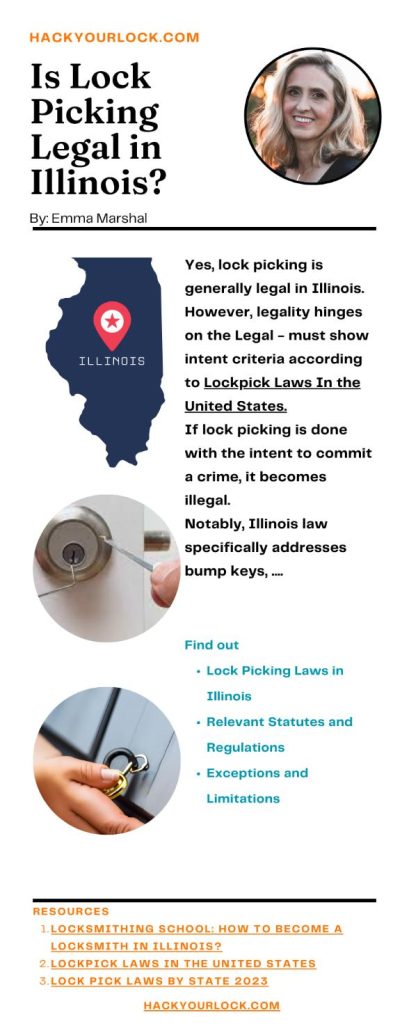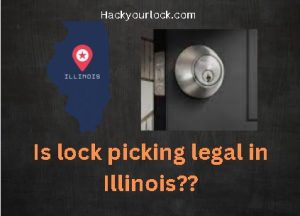Hey curious minds!
Ever been captivated by the intricacies of lock picking? Today, our journey takes us to the heart of Illinois, where we unravel the mystery surrounding lock picking legality.
Is lock picking legal in Illinois?
That’s the question we’re diving into, providing a beginner-friendly guide for those eager to explore the world of tumblers and pins.

Contents
Is Lock Picking Legal in Illinois?

Yes, lock picking is generally legal in Illinois. However, legality hinges on the Legal – must show intent criteria according to Lockpick Laws In the United States.
If lock picking is done with the intent to commit a crime, it becomes illegal.
Notably, Illinois law specifically addresses bump keys, emphasizing the importance of understanding and adhering to the legal nuances when engaging in lock picking activities in the state.
Lock Picking Laws in Illinois

Lock picking laws in Illinois revolve around the question, “Is lock picking legal in Illinois?” Lock picking laws in Illinois are governed by specific statutes designed to regulate the possession and use of lock-picking tools.
Relevant Statutes and Regulations
Here is the information about relevant statutes and regulations regarding lock picking laws in Illinois presented in a table format:
| Statute/Regulation | Description |
| Illinois Criminal Code, Section 19-4 | Addresses the offense of burglary, which includes the unlawful entry into a building with the intent to commit a crime, encompassing lock picking. |
| Illinois Criminal Code, Section 19-1 | Defines the offense of criminal trespass, which involves unauthorized entry onto another’s property, including instances related to lock picking. |
| Illinois Compiled Statutes 5/8-4 | Specifies the legality of possessing burglary tools, including lock-picking tools, with the intent to use them for unlawful activities. |
Conditions under Which Lock Picking is Considered Legal or Illegal in Illinois
In Illinois, the legality of lock picking hinges on specific circumstances and intentions.
Lock picking is generally considered legal when done for legitimate purposes, such as regaining access to personal property or with explicit consent from the property owner.
However, engaging in lock picking with the intent to commit a crime, like burglary or theft, is deemed illegal.
Illinois law also addresses the possession of burglary tools, including lock-picking tools, making it illegal if carried with the intent to use them for unlawful activities.
Therefore, it is essential to exercise lock-picking skills responsibly and within the confines of Illinois’ legal framework.
There is a comprehensive article on Is lock picking illegal in the US for detailed information on all states in this regard.
Following table summarizes the key points from Illinois Statutes – 720 ILCS § 19-2, in Lockpick Laws In the United States.
| Statute | Description |
| 720 ILCS § 19-2 | Possession of Burglary Tools: This statute declares that possessing any key, tool, instrument, device, or explosive suitable for breaking into various structures, with the intent to enter and commit a felony or theft, constitutes the offense of possession of burglary tools. |
| 720 ILCS § 19-2.5 | Unlawful Sale of Burglary Tools: This section defines “lock bumping” and makes it an offense to knowingly sell or transfer any key, including one designed for lock bumping, or a lock pick specifically manufactured or altered for breaking into various structures. The law infers intent to commit a felony from possessing a key designed for lock bumping. |
Exceptions and Limitations
In Illinois, lock picking is legally permitted for licensed locksmiths, law enforcement personnel, and individuals with explicit property owner consent.
Licensing Requirements of Locksmiths in Illinois
Embarking on the journey to become a locksmith in Illinois doesn’t follow a strict set of rules, but certain keys open doors according to Locksmithing School: How to Become a Locksmith in Illinois?
In Illinois, individuals seeking a locksmith license must meet specific eligibility criteria. Applicants must be at least 18 years old, exhibit good moral character, and be free from issues such as alcohol, substance abuse, or narcotic addiction.
A felony conviction within the past 10 years or dishonorable discharge from the armed forces disqualifies an applicant.
To obtain a license, individuals need to pass the State of Illinois Locksmith License Examination, consisting of 305 multiple-choice and true/false questions.
Alternatively, applicants can use ALOA examination scores, provided the exam was taken within three years of the license application. A $500 fee is applicable for utilizing ALOA scores.
The licensing process also includes fingerprinting, a criminal background check, and obtaining general liability insurance of $1,000,000.
License renewal is required every three years, with associated fees totaling $174 (as of November 2023), along with a $50 examination fee.
Penalties for Illegal Lock Picking
| Offense | Penalties |
| Illegal Lock Picking | Engaging in illegal lock picking, especially with the intent to commit a crime, can result in criminal charges. Penalties may include fines, imprisonment, and potential civil liability for damages caused. |
| Possession of Burglary Tools | Possessing tools with the intent to use them unlawfully can lead to criminal charges. Individuals may face fines, imprisonment, or other legal consequences. |
| Unlawful Sale of Burglary Tools | Knowingly selling or transferring tools designed for unlawful entry can result in criminal charges. Offenders may face fines, imprisonment, or other legal repercussions. |
| Use of Lock Bumping Techniques | The use of lock bumping techniques, defined as a lock-picking method using a specially crafted bump key, may lead to legal consequences. The severity of penalties depends on the circumstances. |
| Violation of Licensing Requirements | Failure to comply with locksmith licensing requirements may result in administrative actions, including license suspension or revocation. |
| Failure to Renew License | Neglecting to renew a locksmith license within the specified timeframe may lead to consequences such as fines or a lapse in legal authorization to practice locksmithing. |
Do you want to know about similar aspects related to lock picking in other states as well? Other states like California, Arizona, Alaska, Alabama, Ohio, New York, Washington, Florida, Virginia, Colorado, Connecticut, Delaware , Georgia, Hawaii, Iowa, Idaho etc. have also similar regulations.
Conclusion
The exploration into the legality of lock picking in Illinois comes to a close. So, is lock picking legal in Illinois?
The answer unfolds with responsibility at its core. Generally legal, lock picking allows for educational exploration and skill development.
However, this journey comes with a cautionary note – using these skills with the intent to commit a crime is strictly prohibited.
So, students and locksport enthusiasts alike, remember to navigate the realm of lock picking in Illinois ethically and responsibly
FAQ’s
Can I learn lock picking as a hobby in Illinois?
Yes, lock picking for recreational purposes is generally legal in Illinois. However, always use your skills responsibly and respect others’ property.
Are there age restrictions for learning lock picking in Illinois?
There are no specific age restrictions for learning lock picking, but it’s crucial for individuals, especially minors, to use this knowledge responsibly and under proper guidance.
Can I become a professional locksmith in Illinois without formal education?
Yes, formal education is not mandatory to become a locksmith in Illinois. Practical skills, a clean background, and obtaining necessary licenses and certifications are typically more critical for entering the locksmith profession.
Resources
- Locksmithing School: How to Become a Locksmith in Illinois?
- Lockpick Laws In the United States
- Lock Pick Laws by State 2023
